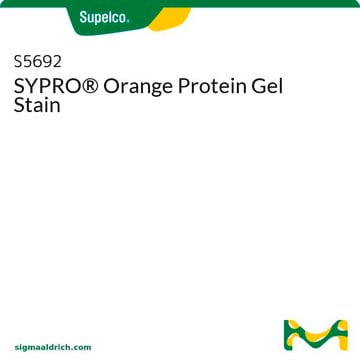ISB1L
InstantBlue™
Ultrafast Protein Stain
Synonim(y):
protein gel stain, protein stain
Zaloguj sięWyświetlanie cen organizacyjnych i kontraktowych
About This Item
Kod UNSPSC:
12352200
NACRES:
NA.32
Polecane produkty
producent / nazwa handlowa
ISBT
metody
protein staining: suitable
temp. przechowywania
2-8°C
Opis ogólny
InstantBlue™ is a ready-to-use solution stain that is specially formulated for ultra-fast (less than 15 min), sensitive (5 ng per band (BSA)) and safe detection of your proteins. Protein gels can be stained with InstantBlue in minutes without the need to wash, fix or destain. Gels can remain in the stain for weeks without concern. Only the proteins are stained resulting in well-defined blue bands on a highly transparent background. The reduction of background interference results in a better signal to noise ratio and may also have a positive impact on the overall resolution and sensitivity. The InstantBlue formulation is non-toxic and does not contain any methanol. Proteins stained using the InstantBlue stain are also compatible with mass spectrometry (MS) analysis.
Zastosowanie
InstantBlue™ has been used in coomassie staining to validate the presence of proteins from SDS-PAGE gels. It has also been used for staining SDS-PAGE gels.
Komponenty
contains Coomassie dye, ethanol, phosphoric acid and solubilizing agents in water. (Caution: Phosphoric acid is a corrosive liquid.)
Inne uwagi
Not available in Sweden and Denmark
Informacje prawne
InstantBlue is a trademark of Expedeon Protein Solutions
This page may contain text that has been machine translated.
produkt powiązany
Numer produktu
Opis
Cennik
Hasło ostrzegawcze
Warning
Zwroty wskazujące rodzaj zagrożenia
Zwroty wskazujące środki ostrożności
Klasyfikacja zagrożeń
Eye Irrit. 2 - Met. Corr. 1 - Skin Irrit. 2
Kod klasy składowania
8A - Combustible corrosive hazardous materials
Klasa zagrożenia wodnego (WGK)
WGK 1
Certyfikaty analizy (CoA)
Poszukaj Certyfikaty analizy (CoA), wpisując numer partii/serii produktów. Numery serii i partii można znaleźć na etykiecie produktu po słowach „seria” lub „partia”.
Masz już ten produkt?
Dokumenty związane z niedawno zakupionymi produktami zostały zamieszczone w Bibliotece dokumentów.
Klienci oglądali również te produkty
SETD6 is a negative regulator of oxidative stress response
Chen A, et al.
Biochimica et Biophysica Acta - Gene Regulatory Mechanisms, 1859(2), 420-427 (2016)
Quantitative profiling of the protein coronas that form around nanoparticles
Docter D, et al.
Nature Protocols, 9(9), 2030-2030 (2014)
Hannes Vanhaeren et al.
eLife, 9 (2020-03-27)
Protein ubiquitination is a very diverse post-translational modification leading to protein degradation or delocalization, or altering protein activity. In Arabidopsis thaliana, two E3 ligases, BIG BROTHER (BB) and DA2, activate the latent peptidases DA1, DAR1 and DAR2 by mono-ubiquitination at
A novel strategy to express different antigens from one modified vaccinia Ankara vaccine vector
Lauer K B, et al.
bioRxiv, 191924-191924 (2017)
Derek M Waldner et al.
Translational vision science & technology, 8(4), 1-1 (2019-07-12)
The posthatching chicken is a valuable animal model for research, but molecular tools needed for altering its gene expression are not yet available. Our purpose here was to adapt the adeno-associated viral (AAV) vector method, used widely in mammalian studies
Produkty
Cell lysis challenges and protein extraction variables for Western blot sensitivity and reproducibility.
Nasz zespół naukowców ma doświadczenie we wszystkich obszarach badań, w tym w naukach przyrodniczych, materiałoznawstwie, syntezie chemicznej, chromatografii, analityce i wielu innych dziedzinach.
Skontaktuj się z zespołem ds. pomocy technicznej







